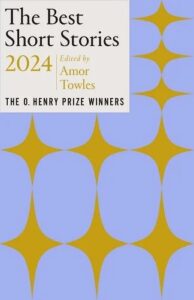
Announcing the Winners of the 2024 O. Henry Prize for Short Fiction
Series Editor Jenny Minton Quigley on the Importance of Finding the Unusual in the Ordinary
Storytelling methods have changed a lot since the days when O. Henry was alive and writing his own immensely popular stories. What is striking about O. Henry is how he never divulged his deepest secret, which only came to be known after his death: that he had been arrested for embezzlement, fled, and returned to spend more than three years in prison.
Louis Menand suggested in The New Yorker that O. Henry’s endings were inspired by the secrets of his past, which he kept carefully concealed. O. Henry’s claim in an audio recording unearthed by Mike Springer at Open Culture and archived in the Austin Public Library that he was merely and simply transcribing his own ordinary observations and experiences in his stories is a cover for the ingenious narrative inventiveness with which he reliably entertained millions.
Although we may not read O. Henry’s stories as often as we once did, his literary spirit lives on in different form in the honorees of the prize his friends created in his honor. This year’s winners, a variety of celebrated and emerging writers, offer us peeks into their processes, their inspirations, what Nabokov called “the throbs” of a story.
But the true secrets of a writer, like those of O. Henry, may remain more deeply buried. What is unusual in a contemporary short story is more likely to be the manner of its writing, the spell that it casts upon the ordinary. O. Henry said, “The unusual is the ordinary rather than the unexpected.”
Through Amor Towles’ 2024 selection of O. Henry Prize winning stories we are allowed glimpses into the minds, lives, and relationships of ordinary people. The stories introduce characters moving through all the stages of life, their revelations conjured up through vivid imagery—a couple driving through snow in a car with a stranger and their cat, a band of RVs in the desert, a canoe drifting on a lake under the stars, a greenhouse full of soccer balls.
We are living in a moment when it is crucial to be able to imagine the souls of our fellow human beings, to see past their curated social media personas, their filtered self-portraits, and their polarized allegiances—to part the curtains on the fleeting, momentary, miraculous sight of their secret selves that is essential for empathy and human connection.
–Jenny Minton Quigley
*
Emma Binder
“Roy“, Gulf Coast
Michele Mari
“The Soccer Balls of Mr. Kurz,” translated from the Italian by Brian Robert Moore, The New Yorker
Brad Felver
“Orphans,” Subtropics
Morris Collins
“The Home Visit,” Subtropics
Jai Chakrabarti
“The Import,” Ploughshares
Amber Caron
“Didi,” Electric Literature
Francisco González
“Serranos,” McSweeney’s Quarterly Concern
Caroline Kim
“Hiding Spot,” New England Review
Katherine D. Stutzman
“Junior,” Harvard Review
Juliana Leite
“My Good Friend,” translated from the Portuguese by Zoë Perry, The Paris Review
Kate DiCamillo
“The Castle of Rose Tellin,” Harper’s Magazine
Colin Barrett
“Rain,” Granta
Robin Romm
“Marital Problems,” The Sewanee Review
Allegra Goodman
“The Last Grownup,” The New Yorker
Dave Eggers
“The Honor of Your Presence,” One Story
E. K. Ota
“The Paper Artist,” Ploughshares
Tom Crewe
“The Room-Service Waiter,” Granta
Madeline ffitch
“Seeing Through Maps,” Harper’s Magazine
Jess Walter
“The Dark,” Ploughshares
Allegra Hyde
“Mobilization,” Story
__________________________________

The Best Short Stories 2024: The O. Henry Prize Winners, edited by Amor Towles and Jenny Minton Quigley, will be published in September by Vintage Books.
Jenny Minton Quigley
Jenny Minton Quigley is a writer and editor. She is the series editor for The Best Short Stories of The Year: The O. Henry Prize Winners, and the author of a memoir, The Early Birds. She is the daughter of Walter J. Minton, the storied former president and publisher of G. P. Putnam's Sons, who first dared to publish Lolita by Vladimir Nabokov in the United States in 1958. A former book editor at several Random House imprints, Minton Quigley lives in West Hartford, Connecticut, with her husband, sons, and dogs.



















